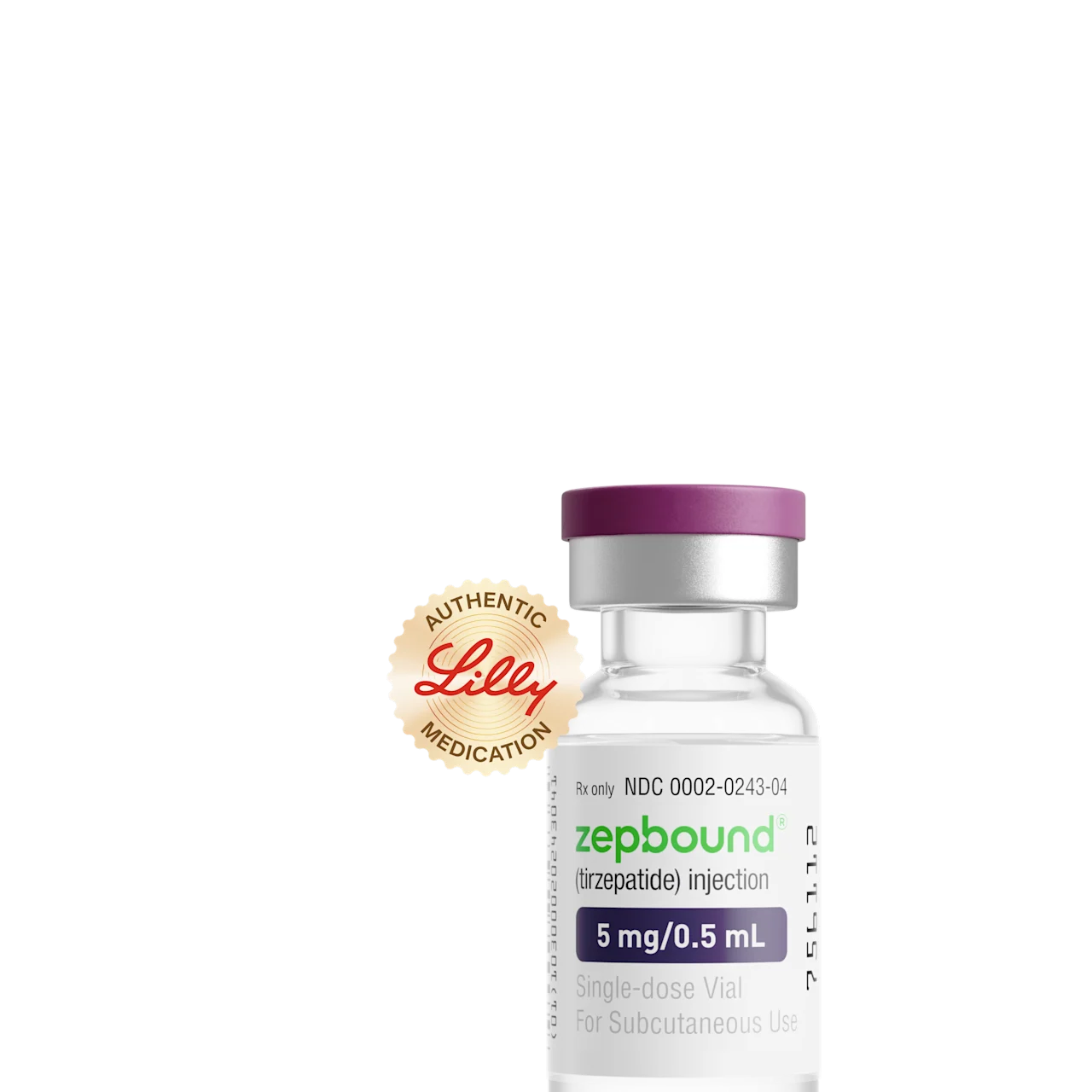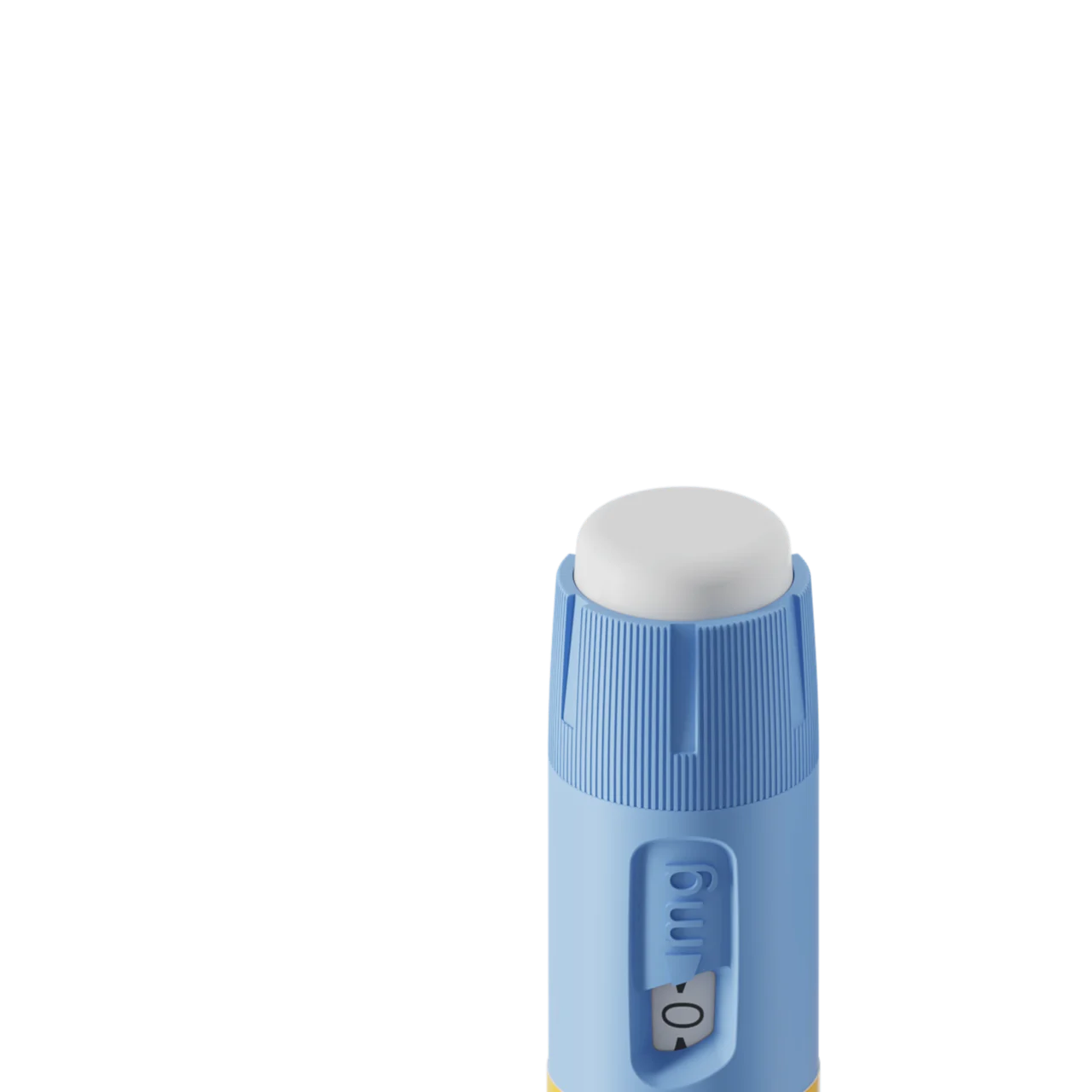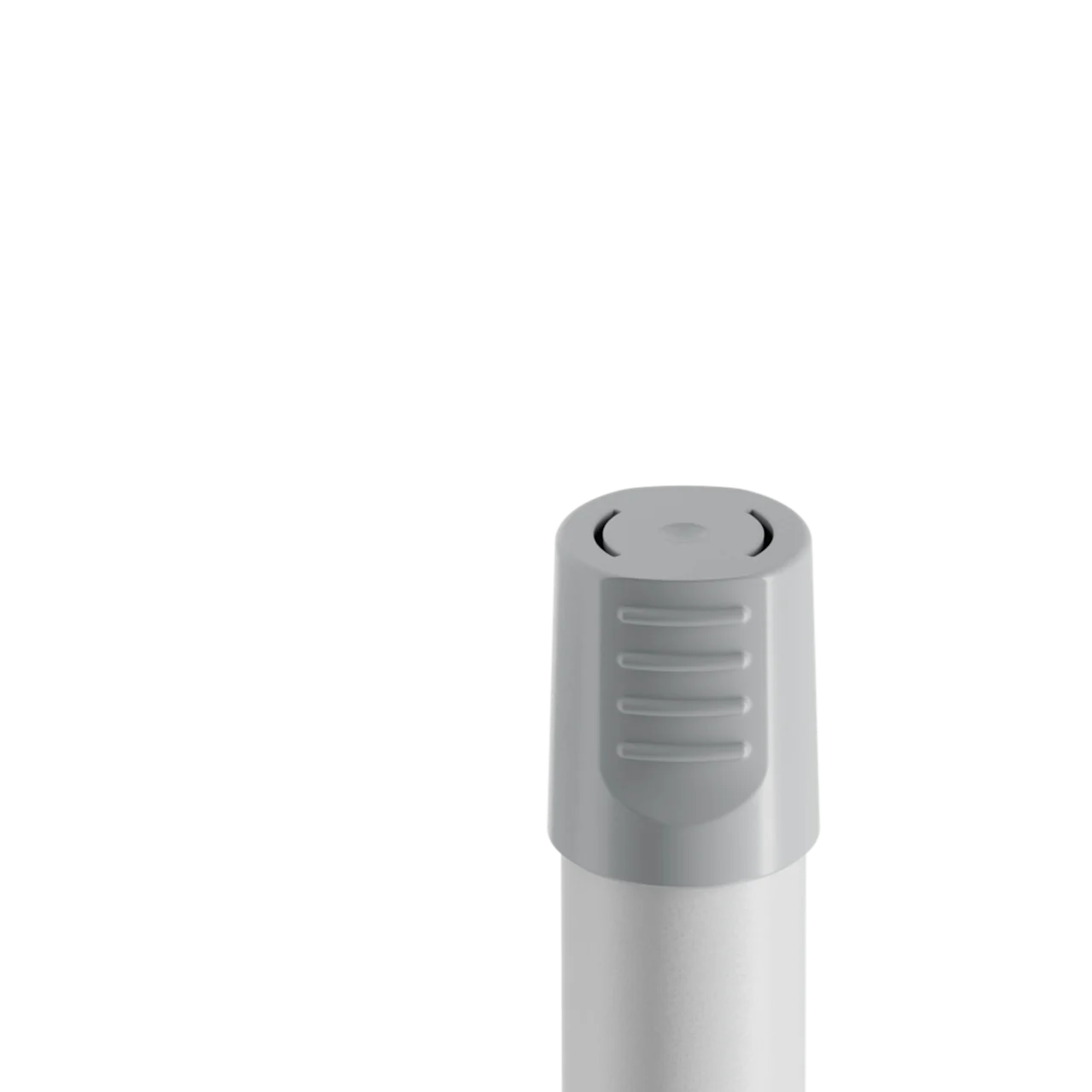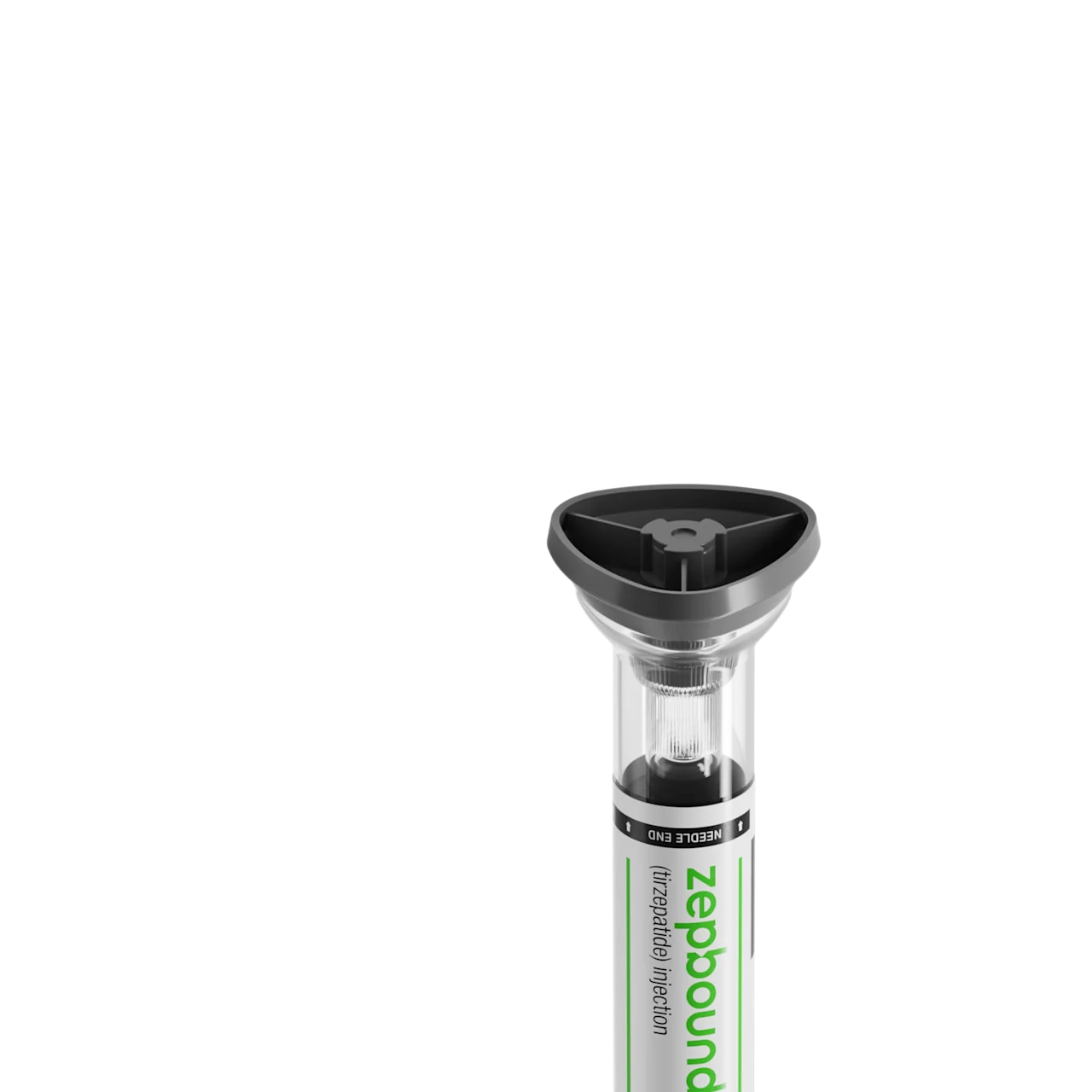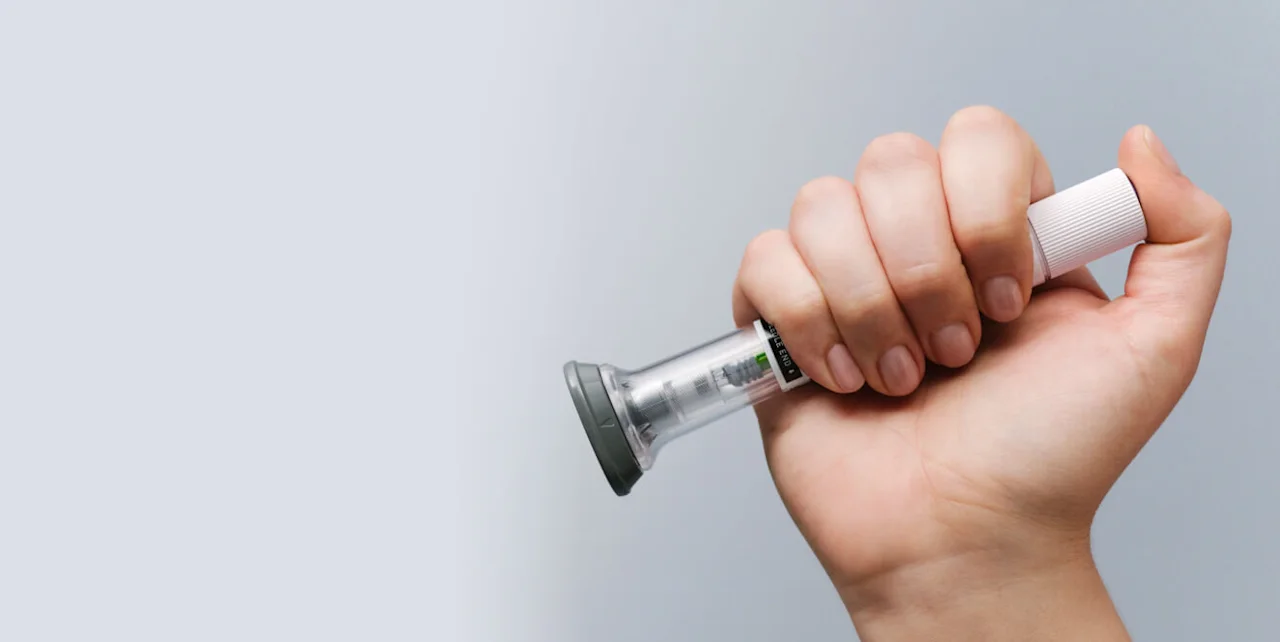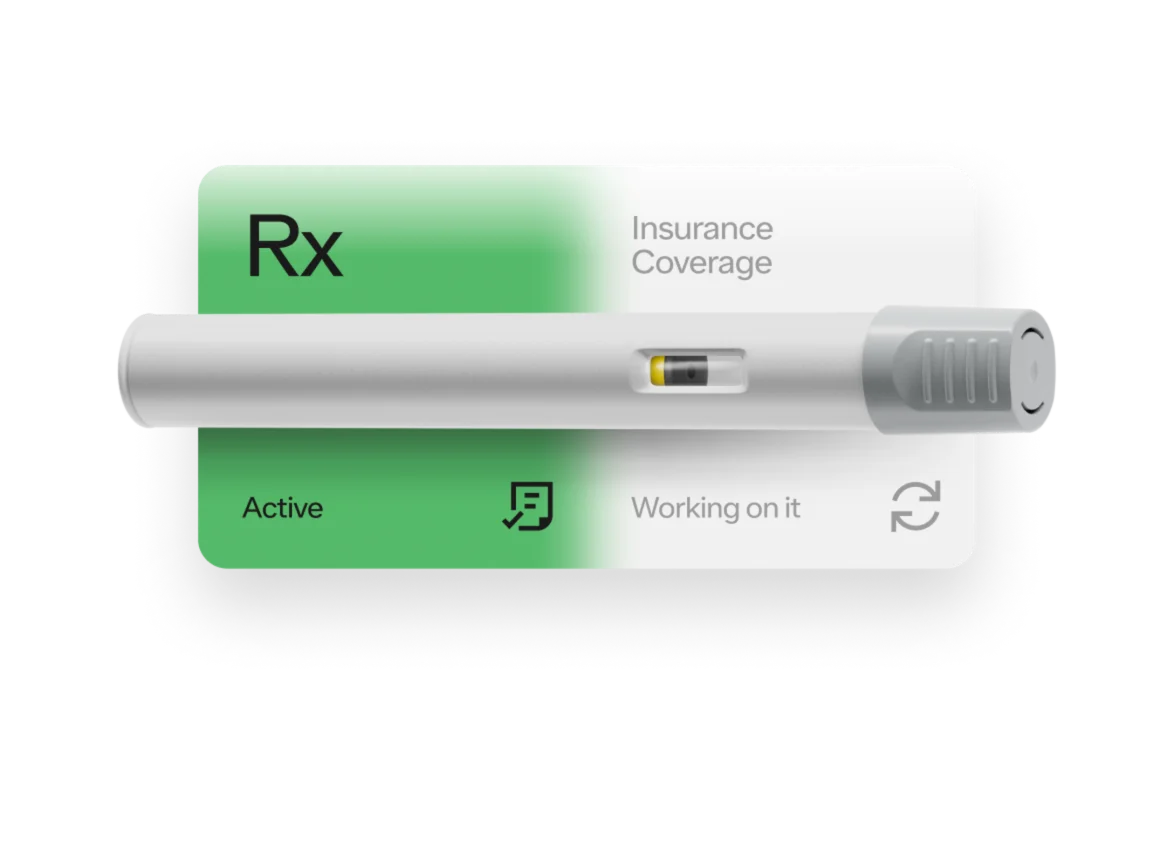Key takeaways
Fatigue is a known side effect of tirzepatide, although it’s less common than gastrointestinal side effects like nausea and stomach pain.
People may feel tired on tirzepatide because they’re eating less. Some of the drug’s side effects can also cause dehydration, which can present as fatigue.
Tirzepatide fatigue usually goes away on its own within a few weeks. In the meantime, staying hydrated, eating smaller but well-balanced meals, and getting enough exercise and sleep can help.
Here's what we'll cover
Key takeaways
Fatigue is a known side effect of tirzepatide, although it’s less common than gastrointestinal side effects like nausea and stomach pain.
People may feel tired on tirzepatide because they’re eating less. Some of the drug’s side effects can also cause dehydration, which can present as fatigue.
Tirzepatide fatigue usually goes away on its own within a few weeks. In the meantime, staying hydrated, eating smaller but well-balanced meals, and getting enough exercise and sleep can help.
When it comes to GLP-1 medications like Mounjaro and Zepbound (tirzepatide), side effects such as nausea and diarrhea seem to get all the attention. But other, non-gastrointestinal symptoms can also be common with tirzepatide. Case in point? Fatigue.
So, why does tirzepatide make you tired, and what can you do to relieve tirzepatide fatigue while taking Mounjaro or Zepbound? Read on as we explore what can cause this side effect and share tips for managing fatigue on tirzepatide.
Does tirzepatide make you tired?
Yes, fatigue can be a common side effect of Zepbound, one of the brand-name drugs that contains tirzepatide as an active ingredient. In clinical trials of Zepbound, around 7% of people taking 15 mg of the drug, 6% of those taking 10 mg, and 5% of those taking 5 mg experienced fatigue, compared with only 3% of those taking a placebo.
Fatigue is not listed as a common side effect of Mounjaro, but that does not necessarily mean that you won’t experience fatigue while taking it. Some people with type 2 diabetes reported fatigue in exit interviews after completing a clinical trial of Mounjaro. And an analysis of social media comments found that fatigue and sleep disturbances were recurring complaints among people taking GLP-1 medications in general. Quick reminder: GLP-1 is the drug class that includes tirzepatide as well as semaglutide, the active ingredient in Ozempic and Wegovy.
Tirzepatide fatigue can present as a general sense of tiredness, weakness, sluggishness, or lack of energy. “Many patients describe it as a low, sluggish fatigue that feels different from normal tiredness,” says Arthur Shektman, MD, a board-certified plastic surgeon with Gynecomastia Center of Boston, who often treats patients with GLP-1s for weight loss prior to performing surgery.
Rx weight loss with Ro
Get access to prescription weight loss medication online
Why does tirzepatide make you tired?
Tirzepatide can make you feel tired for a number of reasons. For one thing, the medication can significantly reduce appetite and, in turn, calorie intake. Within the first eight weeks of treatment, people start consuming nearly 200 fewer calories during lunch than they did before, according to research.
Dr. Shektman says this reduction in energy intake, along with the way the drug works, can cause fatigue. “The medication is altering hormone signaling in ways that not only suppress appetite but can also indirectly decrease energy availability. In some patients, especially those who are sensitive to changes in blood sugar or hydration, this can really feel like they’re hitting a wall,” he explains.
Some of the other potential side effects of tirzepatide—such as nausea, vomiting, and diarrhea—can also contribute to dehydration and electrolyte imbalances, which can cause fatigue, says Paunel Vukasinov, MD, a dual board-certified internist and obesity medicine specialist with Medical Offices of Manhattan. These gastrointestinal side effects can be especially common with tirzepatide. In clinical trials, for example, nausea affected up to 30% of people taking Zepbound, diarrhea affected up to 23% of people, and vomiting affected up to 13% of people.
Fortunately, these side effects tend to go away with time once you’ve reached your maintenance dose (tirzepatide follows a gradual dose escalation process that can take several months, depending on your dosage). But until then, they can cause gastrointestinal distress and fatigue, especially if you’re not taking measures to counteract them, such as following a balanced diet and rehydrating properly.
How long does tirzepatide fatigue last?
“Fatigue from tirzepatide is typically most pronounced in the first few weeks of treatment as the body adapts,” Dr. Vukasinov says. “Many patients report improvement within 2–4 weeks, but for some, it can persist longer, especially if dose escalation occurs.”
Dr. Shektman agrees, saying that as your body adjusts to tirzepatide, your energy levels should stabilize as well: “This fatigue is usually temporary for most of my patients. For some people, it resolves after the first few doses. For others, it can linger a bit longer but becomes more manageable over time.”
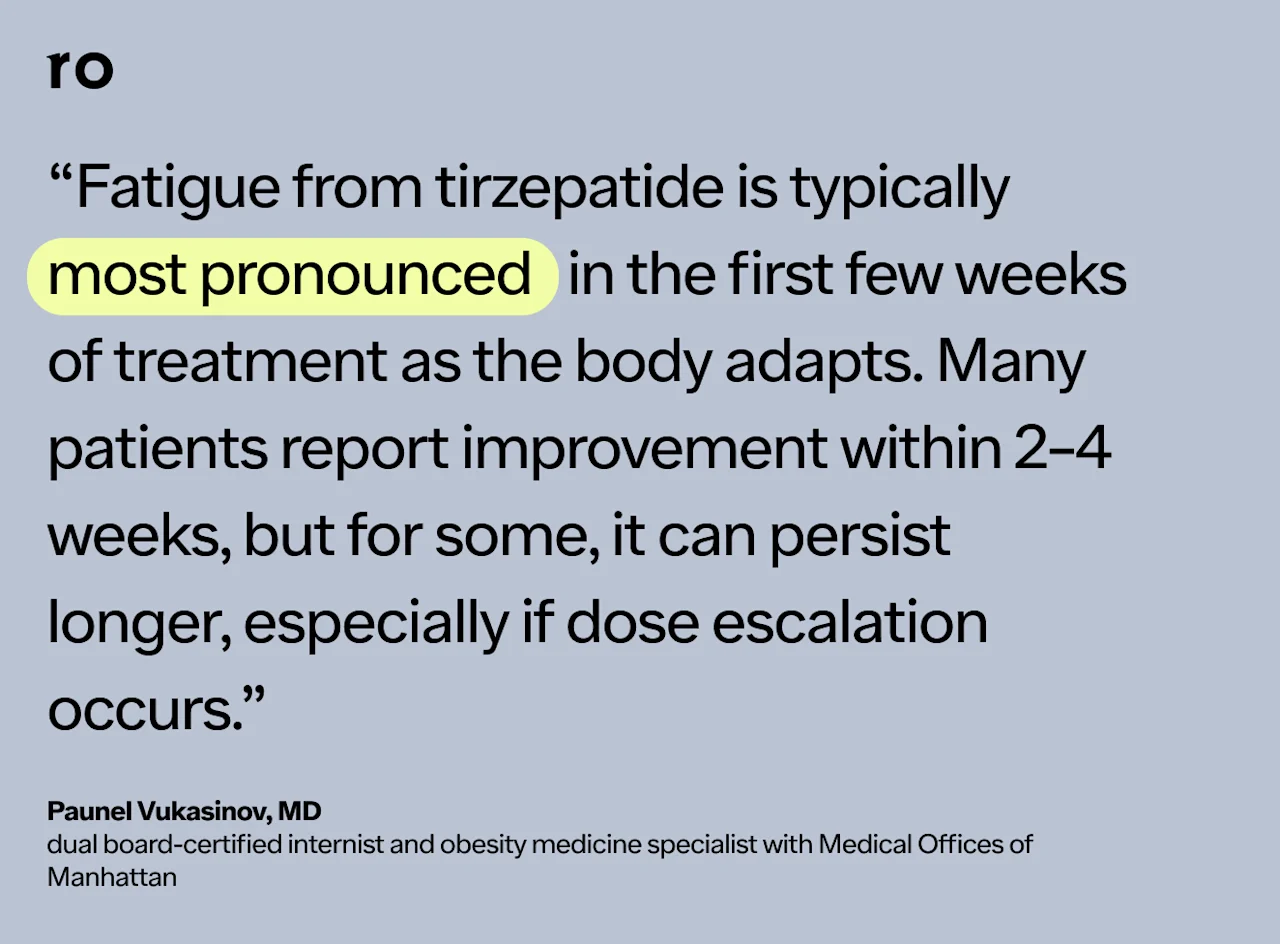
How to treat tirzepatide fatigue
If you’re feeling tired on tirzepatide, there are several small steps you can take to feel more energized again, from adjusting your diet and water intake to improving your exercise and sleep routine.
1. Stay hydrated
Fatigue is one of the first warning signs of dehydration, especially when chronic. If you’re experiencing nausea, vomiting, or diarrhea on tirzepatide, your risk of dehydration is even higher, so make sure you’re drinking plenty of water to avoid serious side effects like kidney problems or severe hypoglycemia (low blood sugar).
Dehydration can occur even without these side effects, Dr. Shektman says. “Dehydration can be sneaky on these medications because appetite suppression means people often forget to drink water. I encourage patients to stay ahead of it and focus on fluids with electrolytes if needed.”
2. Exercise regularly
Exercise is recommended when taking tirzepatide, and research shows that regular exercise can lessen fatigue and improve energy. This doesn’t mean you have to spend all your time exhausting yourself at the gym, though. You can start with 20 minutes of low-to-moderate-intensity exercise. Dr. Vukasinov says even light exercise, such as walking, can boost energy levels over time.
3. Eat smaller meals
You may already be eating less overall, thanks to the appetite-reducing effects of tirzepatide. But you may want to take care to eat smaller, more frequent meals to rebalance your energy levels, Dr. Shektman says. Research shows that people tend to feel more fatigued after a calorie-heavy meal, an effect that can be even more pronounced in people with higher body weights.
When eating less, it’s important to pay attention to what you’re eating to ensure you’re getting enough essential nutrients. Dr. Vukasinov recommends eating smaller meals with a good balance of healthy fats, proteins, and complex carbs to help stabilize blood sugar levels and prevent fatigue.
4. Get restful sleep
This one may feel obvious, but if you’re feeling fatigued, you could simply not be getting enough shut-eye. Or it’s possible that the sleep you’re getting isn’t restful, which may ring true for you if you’re taking tirzepatide to treat your sleep apnea.
“Prioritizing rest can help counteract fatigue on tirzepatide,” Dr. Vukasinov says. If you’re not getting at least 7–9 hours of sleep per night, that’s a good place to start. For more restorative sleep, try these other sleep hygiene tips:
Winding down each night with a relaxing bedtime routine that may include calming muscle or progressive muscle relaxation
Practicing mindfulness interventions during the day, such as meditation or tai chi
Regularly exercising during the day, outside if possible
Getting bright light during the day and avoiding it at night
Keeping your bedroom cool, dark, and quiet
5. Talk to your healthcare provider
Finally, if your tirzepatide fatigue doesn’t seem to be going away, even after implementing some of these lifestyle changes, Dr. Vukasinov says it’s worth checking in with your healthcare provider. They may slow down your dose titration schedule to help your body better adapt to the drug or order tests to see if something else may be contributing to your fatigue. “If fatigue persists beyond a few weeks or is severe, it may be worth evaluating other contributing factors such as anemia, thyroid function, or medication interactions,” he shares.
Bottom line
If you’re considering taking tirzepatide—or if you’re already taking it and wondering why you feel a certain way—it’s good to be aware of the side effects. One lesser-known but possible side effect of tirzepatide is fatigue.
Fatigue is a common side effect of tirzepatide, affecting up to 7% of people on Zepbound. You may notice yourself feeling more tired, weak, or sluggish than usual.
The fatigue can stem from eating fewer calories (i.e. less energy), or it may be a result of some of the drug’s other side effects, such as nausea, vomiting, or diarrhea. These can lead to dehydration, which in turn can cause fatigue.
Tirzepatide fatigue is most common during the dose escalation process, which can take several months to complete. For most people, the fatigue resolves on its own during the first two to four weeks.
If you’re feeling tired on tirzepatide, healthcare providers recommend drinking plenty of water and electrolytes, exercising regularly, eating smaller but balanced meals, and getting enough sleep.
Frequently asked questions (FAQs)
Does tirzepatide make you sleepy?
Yes, fatigue is a known side effect of tirzepatide, along with constipation and abdominal pain. Between 5%–7% of people taking Zepbound reported fatigue in clinical trials. Fatigue can also result from some of the gastrointestinal side effects caused by tirzepatide and other GLP-1s, such as vomiting.
How can you get energy while on tirzepatide?
To improve energy levels while on tirzepatide, make sure that you are exercising regularly, staying hydrated, and following a balanced diet. Specifically, diets that contain ample fiber, polyphenols, and omega-3 fatty acids have been investigated to see if they reduce fatigue (at least when related to certain diseases). The Nordic and Mediterranean diets may be good models of such an eating plan since they focus on whole grains, leafy greens, and fish.
How long does Mounjaro tiredness last?
The healthcare providers interviewed said that for most people, Mounjaro tiredness tends to last 2–4 weeks, but data from clinical trials did not provide this detail. In some cases, it may last longer, especially if you are ramping up to higher doses of tirzepatide.
How does tirzepatide make you feel?
Reviews of Zepbound often mention reduced appetite and weight loss as positive outcomes of taking tirzepatide, while downsides tend to include side effects such as nausea, vomiting, and diarrhea. Ultimately, the weight loss may also lead to other benefits, such as reduced fatigue (yes, even after feeling tired at the beginning of treatment), more energy, and a better sense of wellbeing.
DISCLAIMER
If you have any medical questions or concerns, please talk to your healthcare provider. The articles on Health Guide are underpinned by peer-reviewed research and information drawn from medical societies and governmental agencies. However, they are not a substitute for professional medical advice, diagnosis, or treatment.
GLP-1 Important Safety Information: Read more about serious warnings and safety info.
Mounjaro Important Safety Information: Read more about serious warnings and safety info.
Zepbound Important Safety Information: Read more about serious warnings and safety info.
Ozempic Important Safety Information: Read more about serious warnings and safety info.
Wegovy Important Safety Information: Read more about serious warnings and safety info.
References
Albakri, U., Drotos, E., & Meertens, R. (2021). Sleep Health Promotion Interventions and Their Effectiveness: An Umbrella Review. International Journal of Environmental Research and Public Health, 18(11), 5533. doi: 10.3390/ijerph18115533. Retrieved from https://pmc.ncbi.nlm.nih.gov/articles/PMC8196727/
Arillotta, D., Floresta, G., Guirguis, A., et al. (2023). GLP-1 Receptor Agonists and Related Mental Health Issues; Insights from a Range of Social Media Platforms Using a Mixed-Methods Approach. Brain Sciences, 13(11), 1503. doi: 10.3390/brainsci13111503. Retrieved from https://pmc.ncbi.nlm.nih.gov/articles/PMC10669484/
Chaput, J. P., Dutil, C., & Sampasa-Kanyinga, H. (2018). Sleeping hours: what is the ideal number and how does age impact this?. Nature and Science of Sleep, 10, 421–430. doi: 10.2147/NSS.S163071. Retrieved from https://pmc.ncbi.nlm.nih.gov/articles/PMC6267703/
Eli Lilly-a. (2024). Highlights of Prescribing Information: Mounjaro (tirzepatide) injection, for subcutaneous use. Retrieved from https://pi.lilly.com/us/mounjaro-uspi.pdf
Eli Lilly-b. (2024). Highlights of Prescribing Information: Zepbound (tirzepatide) injection, for subcutaneous use. Retrieved from https://pi.lilly.com/us/zepbound-uspi.pdf
Farzam, K. & Patel, P. (2024). Tirzepatide. StatPearls. Retrieved from https://www.ncbi.nlm.nih.gov/books/NBK585056/
Gorgojo-Martínez, J. J., Mezquita-Raya, P., Carretero-Gómez, J., et al. (2022). Clinical Recommendations to Manage Gastrointestinal Adverse Events in Patients Treated with Glp-1 Receptor Agonists: A Multidisciplinary Expert Consensus. Journal of Clinical Medicine, 12(1), 145. doi: 10.3390/jcm12010145. Retrieved from https://pmc.ncbi.nlm.nih.gov/articles/PMC9821052/
Haß, U., Herpich, C., & Norman, K. (2019). Anti-Inflammatory Diets and Fatigue. Nutrients, 11(10), 2315. doi: 10.3390/nu11102315. Retrieved from https://pmc.ncbi.nlm.nih.gov/articles/PMC6835556/
Heise, T., DeVries, J. H., Urva, S., et al. (2023). Tirzepatide Reduces Appetite, Energy Intake, and Fat Mass in People With Type 2 Diabetes. Diabetes Care, 46(5), 998–1004. doi: 10.2337/dc22-1710. Retrieved from https://pmc.ncbi.nlm.nih.gov/articles/PMC10154650/
Jastreboff, A. M., Aronne, L. J., Ahmad, N. N., et al. (2022). Tirzepatide once weekly for the treatment of obesity. New England Journal of Medicine, 387(3), 205–216. doi: 10.1056/nejmoa2206038. Retrieved from https://www.nejm.org/doi/full/10.1056/NEJMoa2206038
Lehrskov, L. L., Dorph, E., Widmer, A. M., et al. (2018). The role of IL-1 in postprandial fatigue. Molecular Metabolism, 12, 107–112. doi: 10.1016/j.molmet.2018.04.001. Retrieved from https://pmc.ncbi.nlm.nih.gov/articles/PMC6001918/
Malhotra, A., Bednarik, J., Chakladar, S., et al. (2024). Tirzepatide for the treatment of obstructive sleep apnea: Rationale, design, and sample baseline characteristics of the SURMOUNT -OSA phase 3 trial. Contemporary Clinical Trials, 141, 107516. doi: 10.1016/j.cct.2024.107516. Retrieved from https://pmc.ncbi.nlm.nih.gov/articles/PMC11168245/
Matza, L. S., Stewart, K. D., Landó, L. F., et al. (2022). Exit Interviews Examining the Patient Experience in Clinical Trials of Tirzepatide for Treatment of Type 2 Diabetes. The Patient, 15(3), 367–377. doi: 10.1007/s40271-022-00578-8. Retrieved from https://pmc.ncbi.nlm.nih.gov/articles/PMC9095514/
Taylor, K., Tripathi, A. K., & Jones, E. B. (2022). Adult Dehydration. StatPearls. Retrieved from https://www.ncbi.nlm.nih.gov/books/NBK555956/
Wadden, T. A., Chao, A. M., Machineni, S., et al. (2023). Tirzepatide after intensive lifestyle intervention in adults with overweight or obesity: the SURMOUNT-3 phase 3 trial. Nature Medicine, 29(11), 2909–2918. doi: 10.1038/s41591-023-02597-w. Retrieved from https://pmc.ncbi.nlm.nih.gov/articles/PMC10667099/
Wender, C. L. A., Manninen, M., & O'Connor, P. J. (2022). The Effect of Chronic Exercise on Energy and Fatigue States: A Systematic Review and Meta-Analysis of Randomized Trials. Frontiers in Psychology, 13, 907637. doi: 10.3389/fpsyg.2022.907637. Retrieved from https://pmc.ncbi.nlm.nih.gov/articles/PMC9206544/




